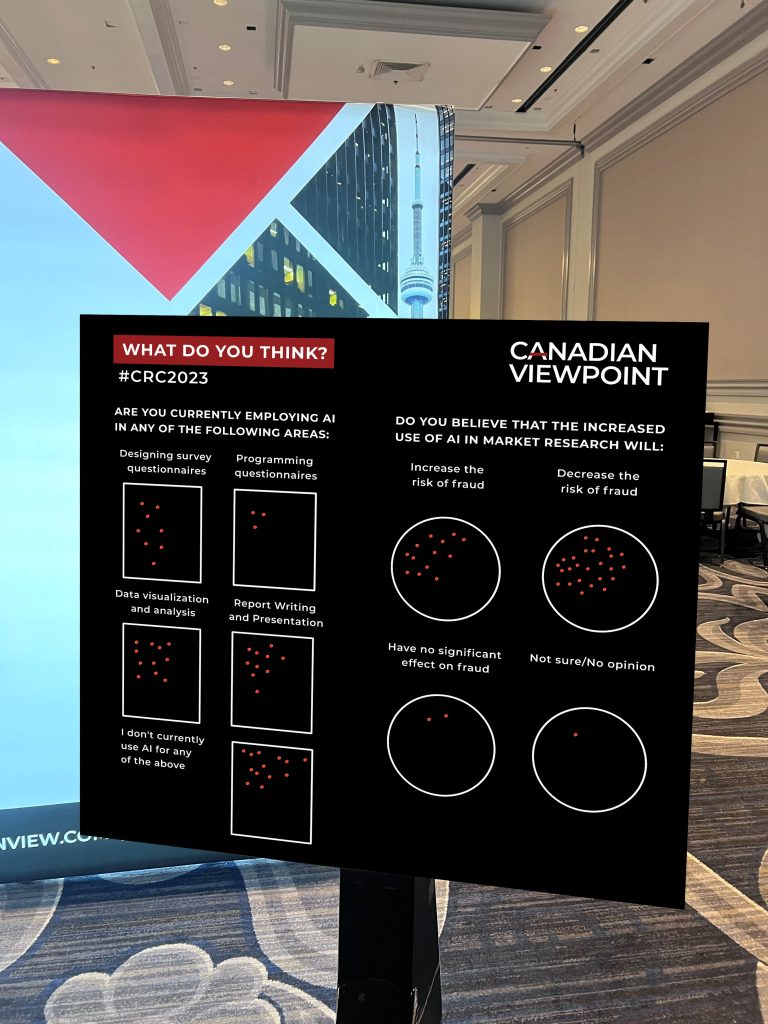AI in Market Research: Current Adoption and Perceived Impact on Fraud Among Industry Professionals
Canadian Viewpoint recently surveyed industry professionals at the Consumer Research Conference to explore their thoughts and practices concerning the use of Artificial Intelligence (AI) in their work. We asked two questions, gathering insightful data on their current AI utilization and perspectives on the growing use of AI in market research.
Using an interactive ‘sticker board activity,’ 41 participants visually expressed their collective opinions by placing stickers on a board. Discussions revealed concerns about data quality due to the increasing use of AI. While most participants express a need to adapt and leverage AI, there’s a shared apprehension about associated risks.
The results shed light on the current adoption of AI tools and their perceived impact on the industry’s integrity. Let’s delve into the key findings for a glimpse into the evolving landscape of AI in market research.

Question 1: Current Adoption of AI in Market Research
Designing Survey Questionnaires
8 out of 41 respondents revealed that they are actively employing AI in designing survey questionnaires. This reveals a growing recognition of AI’s potential in streamlining the crucial process of crafting effective survey instruments.
For example, AI can be utilized to analyze historical survey data to identify which types of questions yield the most informative responses. It can also suggest question formats based on the target demographic, enhancing the relevance and effectiveness of the questionnaire.
Programming Questionnaires
While a slightly smaller fraction, 3 respondents, are using AI in programming questionnaires, it highlights a niche application of AI in the technical aspects of market research.
We at Canadian Viewpoint are currently experimenting with AI to assist in the scripting of questionnaires. By utilizing AI algorithms, we aim to automate parts of the scripting process, thereby increasing efficiency and reducing the likelihood of human error. Additionally, we are exploring the use of AI in quality control, where it can systematically help us identify and correct errors or inconsistencies in questionnaire programming. These initiatives exemplify our commitment to leveraging AI to enhance the accuracy and reliability of our market research tools.
Data Visualization and Analysis
A substantial number of 11 respondents are harnessing the power of AI for data visualization and analysis. This trend suggests a recognition of AI’s capacity to handle large datasets efficiently and derive meaningful insights.
Report Writing and Presentation
Recognizing AI’s pivotal role in report writing and presentation, 10 respondents expressed that they are actively leverage automation, enhancing the overall reporting experience.
No Current Use of AI
1 in 7 respondents expressed that they currently do not use AI for any of the listed areas. This presents an opportunity for AI advocates to bridge the gap and showcase the potential benefits of integrating AI into various aspects of market research.
Question 2: Perceived Impact of Increased AI Usage on Fraud
Increase in the Risk of Fraud
Out of the 41 respondents surveyed in question one, 13 expressed concern that the increased use of AI might elevate the risk of fraud.
As AI becomes more prevalent in market research, concerns about identity fraud are rising. AI-powered algorithms can now create highly convincing digital personas with detailed personal information and realistic behaviours. These fabricated personas could participate in surveys, providing seemingly genuine responses. Detecting such identity fraud becomes challenging, potentially distorting survey data and misrepresenting participants’ sentiments and opinions. Additionally, it’s important to note that regular users can also use AI to come up with answers for open-ended survey questions.
Decrease in the Risk of Fraud
Contrastingly, a substantial majority of 25 respondents believe that the expanded use of AI will decrease the risk of fraud. This optimistic perspective aligns with the growing trust in AI algorithms to enhance accuracy, efficiency, and data integrity.
This positive viewpoint is based on the understanding that AI algorithms have the potential to improve fraud prevention significantly. AI has the ability to actively monitor and analyze data, identifying unusual patterns and potential signs of fraud. Moreover, it can adapt to evolving fraud tactics, staying one step ahead. AI also strengthens identity verification processes, making unauthorized access more challenging. Additionally, it utilizes predictive analytics to address vulnerabilities proactively. The combination of these capabilities is why the industry is increasingly placing trust in AI to enhance data integrity and contribute to robust fraud prevention.
Neutral and Uncertain Views on AI’s Impact on Fraud in Research
A small number, about 1 in 20 respondents, believe that increased AI usage won’t have a significant impact on fraud. This perspective, shared by a minority, highlights the importance of ongoing discussions regarding how AI influences research practices. Additionally, one respondent is unsure about the impact of increased AI usage on fraud, acknowledging the complexity of this topic. It’s noteworthy that 95% of participants believe that AI will impact fraud.
Conclusion
In conclusion, the outcomes of the interactive survey reveal that Artificial Intelligence (AI) is progressively gaining traction across diverse domains in the industry. While a segment of professionals readily adopts AI for survey design, programming, and analysis, a cohort exercises caution, especially concerning fraud-related concerns. As the industry undergoes continual transformation, it becomes imperative to cultivate conversations regarding responsible AI integration and mitigating perceived risks. These discussions are vital for unlocking the complete potential of AI within the dynamic realm of market research.




